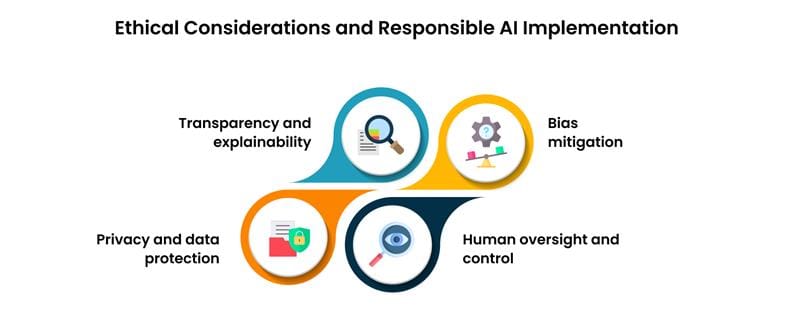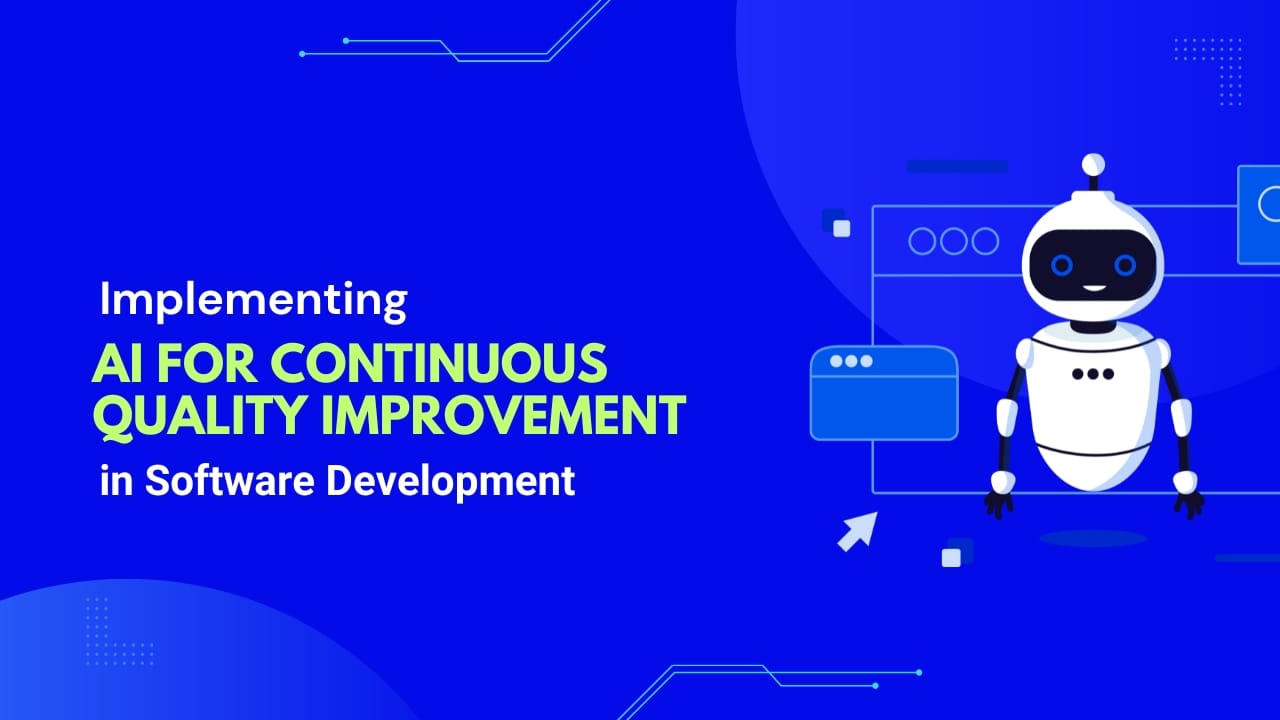This fast-paced digital world requires superior software development to drive any business ahead. As organizations increasingly try for delivering quality innovative solutions faster, inclusion of AI in the DevOps practice has emerged to be a transformative approach. McKinsey reported that 67% of companies have implemented AI into the process of their development. With AI, software teams can bring unparalleled levels of efficiency, accuracy, and continuous improvement in quality, catapulting software delivery to unprecedented peaks.
AI and DevOps: A New Era in Software Development
AI and DevOps (AIOps) have now become part of the software development process empowering a paradigm shift in the way software is developed today. DevOps bridges a gap between the development and operations team in creating and testing in real time through agile methodologies and continuous integration in deploying software with automation. DevOps can bring in new levels of performance when using AI since the capacities of AI in terms of data analysis and decision-making enforce unprecedented automation, optimization, and proactive problem-solving. There are numerous ways through which the productivity of workflows and thereby the overall software teams can be enhanced to manufacture better-reliability products using AI technology that conveys concepts of machine learning and natural language processing.
Advancing CI/CD with AI-Driven Automation
A major AI contribution in DevOps is within continuous integration and continuous delivery (CI/CD). AI-driven automation has transformed code building, testing, and deployment, enabling fast, smooth integration of changes and rapid deployment to production.
- Intelligent Code Analysis: AI algorithms scan code repositories to identify vulnerabilities or inefficiencies and suggest corrective actions before they evolve into more significant issues.
- Automated Testing: AI-based testing frameworks can run exhaustive test suites, simulating real-world scenarios and finding edge cases often missed by human testers.
- Smart Release Management: Leveraging machine learning models, AI predicts the impact of code changes, optimizing the release process and suggesting the best deployment strategies based on historical data.
Enhanced Monitoring and Incident Response
A robust DevOps approach is at its core quite about monitoring and incident response. AI brings anomaly detection, intelligent alerting, and root cause analysis in minutes rather than in hours.
- Predictive Monitoring: AI continuously analyses the data, identifies the deviations, and catches potential issues before they are classified as incidents.
- Intelligent Alerts: Natural language processing from AI enables analyzing logs and system metrics to create actionable, context-driven alerts for DevOps teams.
- Root Cause Analysis: In case of such incidents, AI can go through vast chunks of data in minutes to pinpoint the root cause and rectify the issue, making it probable for such incidents not to recur.
Optimizing Resource Management with AI
Resource management and infrastructure provisioning can make or break optimal performance and cost efficiency; AI significantly improves resource allocation, capacity planning, and infrastructure optimization.
- Predictive Capacity Planning: By the use of historical patterns in usage, AI predicts the trends and requirements of resources in the future, thereby avoiding over and under-provisioning.
- Dynamic Resource Allocation: The calculation of AI algorithms to procure the resource according to the actual real-time demand, the applications and services derive optimal performance.
- Infrastructure Optimization: It is in this section that AI will inspect the infrastructure setting to advise on further changes to reduce costs, increase usage of available resources, and improve system performance.
Supporting Continuous Learning and Skill Development
This is an ongoing process for competitive software teams: AI facilitates this process with customized learning resources, areas for improvement, and the sharing of knowledge.
- Personalized Learning Paths: Personalized Learning Paths AI personalizes the learning recommendations; this is based on the strengths, weaknesses, and preferences of each member to fill in the gap of lacking crucial skills in them.
- Knowledge Gap Analysis: Knowledge Gap Analysis AI analyzes the project documentation and code repositories to know exactly where the opportunities for training are mostly needed.
- Smart Knowledge Management: AI-powered systems curate and organize knowledge, fostering easy access and collaboration within teams.
Strengthening Security and Ensuring Compliance
AI gives powerful capabilities in lifting security, detecting vulnerabilities, and ensuring compliance throughout the software development cycle.
- Vulnerability Detection: AI scans code, dependencies, libraries, and other sources and flags security threats, providing concrete and actionable recommendations.
- Advanced Threat Monitoring: AI models track logs, traffic, and user behavior patterns to sense anomalies or threats and enables rapid responses.
- Automated Compliance: AI helps simplify compliance, assures that software follows regulations of the industry, and thereby decreases risks linked to non-compliance.
Streamlining Documentation and Knowledge Sharing
Documentation and knowledge sharing are integral to successful software development. AI streamlines these tasks, reducing developers’ workloads and ensuring accurate, accessible documentation.
- Automated Code Documentation: AI scans code repositories, generating documentation with function descriptions and examples, saving time.
- Knowledge Extraction: With the use of NLP, AI extracts insights from code comments, issue trackers, and discussions, fostering efficient knowledge sharing.
- Interactive Documentation Assistants: AI-driven assistants assist developers with context-aware assistance, improving productivity and reducing onboard time.
Intelligent Code Generation and Refactoring
AI will not replace developers but can mechanize redundant tasks and improve efficiency in coding by intelligent code generation and refactoring suggestions.
- Code Generation: AI models generate short code snippets from descriptions, speed up the entire development process, and will eventually abolish boilerplate coding.
- Refactoring Suggestions: AI reviews codebases, recommending optimizations to improve quality, maintainability, and performance.
- Code Translation and Migration: AI supports code translation between languages or frameworks, reducing the challenges of such transitions.
Intelligent Project Management and Collaboration
Project management and collaboration are essential for delivering successful software solutions. AI enhances these areas through smarter task prioritization, resource allocation, and communication support.
- Task Prioritization: AI analyzes project requirements and dependencies to recommend an efficient task order, ensuring timely delivery.
- Resource Allocation Optimization: AI matches tasks to team members’ skills, ensuring efficient resource use.
- Communication Facilitation: AI-powered chatbots and assistants aid team communication, handling scheduling and context-aware responses.
Always improve and adapt to the market
AI enables software teams to make data-informed decisions, optimize processes, and adjust reactively to changing demands.
- With Data-Informed Decisions: By analyzing project metrics, customer feedback and trends, and other relevant elements related to the market AI can suggest what action you might take strategically.
- Process Optimization: AI identifies bottlenecks in the workflow, thus allowing the teams to optimize their process and increase the overall efficiency.
- Proactive Adaptation: AI is always on the lookout for trends in the market, enabling organizations to shift their strategies and remain competitive.
Responsible AI Implementation: Meeting Ethical Requirements
AI has vast, endless possibilities and must be used responsibly and ethically. The organization can establish trust by being transparent, accountable, and fair.
- Transparency and Explainability: AI’s decisions should be transparent and explainable for all stakeholders in the context of how and why specific choices were made.
- Mitigating Bias: AI design needs to check bias to ensure equality in dealing with all individuals and communities.
- Privacy and Data Security: Data governance policies can ensure safekeeping of sensitive information while keeping abreast of measures required to be compliant.
- Human Oversight: While AI may automate much, it should still be under human oversight in ethical decision-making.

Embracing AI in software development for competitive advantage
The integration of AI in software development has changed the way organizations create, deploy, and manage software solutions. The involvement of AI can yield unprecedented quality and efficiency for the software team so they lead the market within a rapidly developing digital world. Successful AI adoption demands strategic efforts through invested infrastructure, workforce preparation, and constant learning cultures. Organizations can produce quality software and hence obtain growth with AI-driven innovation and optimization.
Ready to Harness AI for Superior Software Quality?
For organizations ready to explore AI’s benefits in software development, consulting with industry leaders can provide a roadmap to success. Contact Qentelli today for a consultation to discover how AI can elevate your software development strategy and drive digital success.

